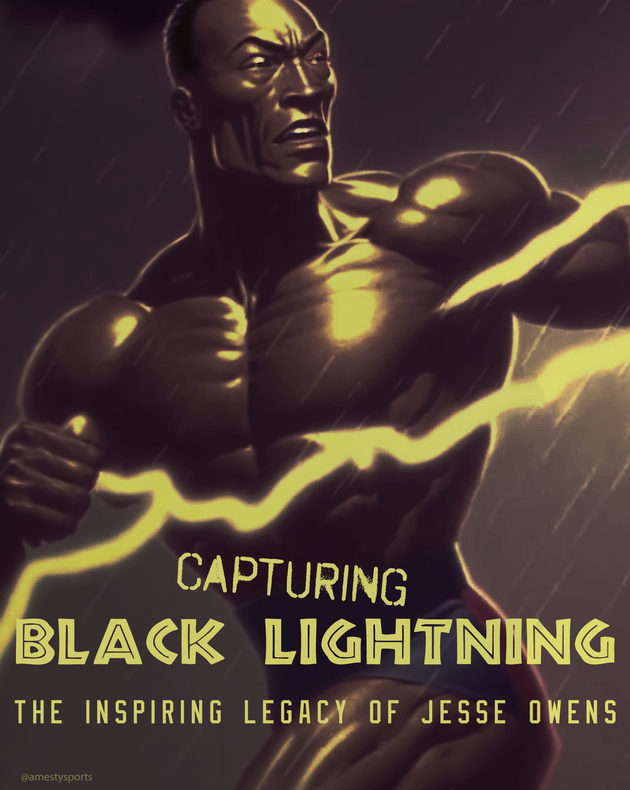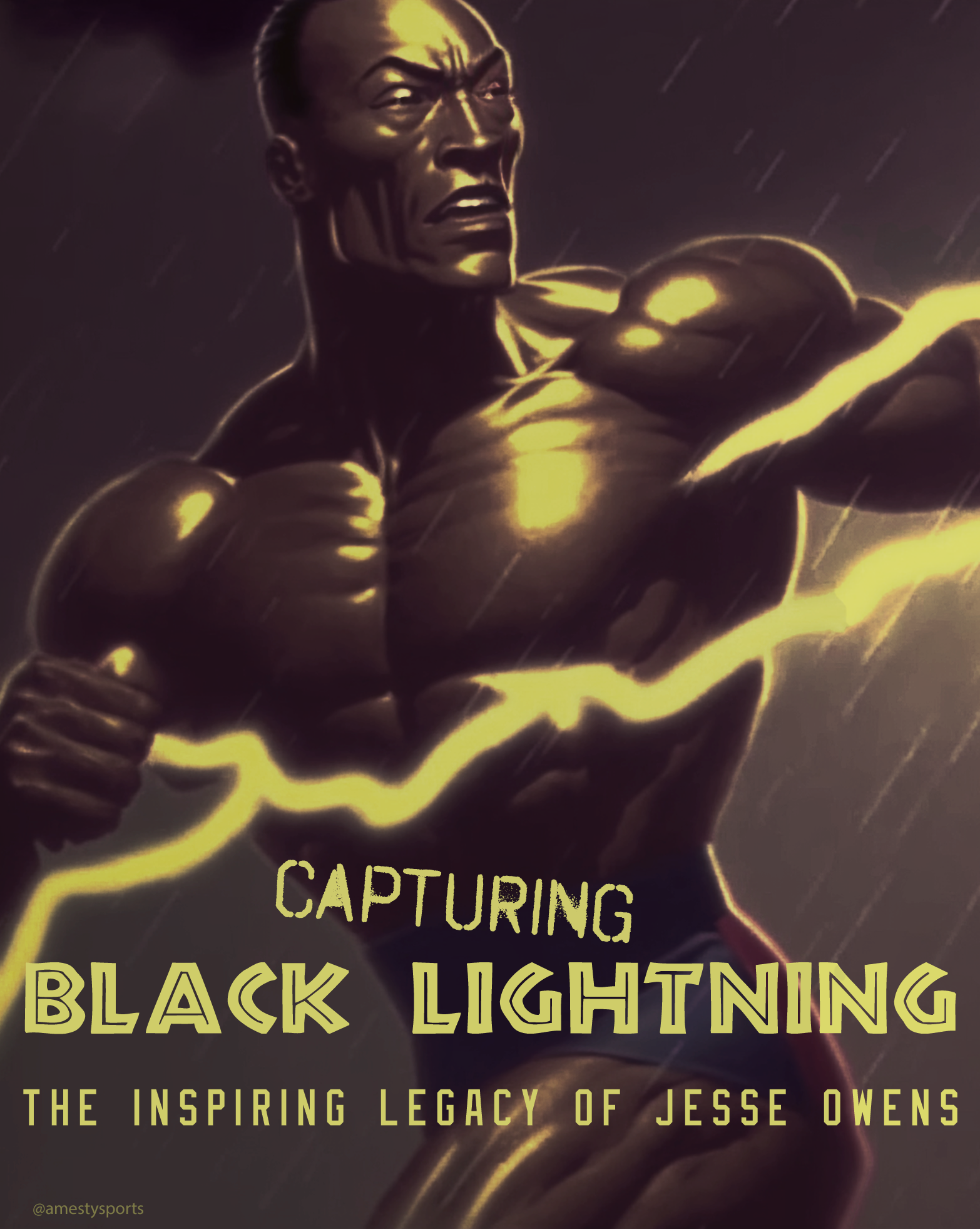
Pressure Cooker
We've all been there, sitting in class with a midterm, final exam, or term paper looming over us, knowing that our academic success depends on a good grade. The pressure can be overwhelming as we struggle to recall the lectures we recorded on our smartphones and the pages of notes we took. But take a deep breath, dear student. Remember that every fact you've learned since kindergarten has prepared you for this moment and is at your disposal. The rigorous admissions process you went through to get here has proven that you belong in college.
And even if things don't go as planned, remember that college is a business, and there's always another opportunity to retake the exam, even if it means paying out of pocket. Your parents, your university, your professors, and even the head of the PR department at your school, are all rooting for you and want to see you succeed.
Now imagine being told since kindergarten that you have limitations and shortcomings. How would taking that exam feel when you are constantly reminded of society's belief in your inferiority and the futility of your dreams? The pressure is immense, knowing that not only do you have to succeed for yourself but also for millions who need you to succeed, while tens of millions hope for your failure.
But there have been brave individuals who have overcome these hurdles despite the odds and expectations against them. In particular, trailblazing athletes have become the first Black athletes to play professionally in their respective sports. While today's American sports leagues are more inclusive and merit-based, this was not always the case. Due to the color of their skin, many of the nation's best athletes were barred from participating in sports because of social and legal barriers.
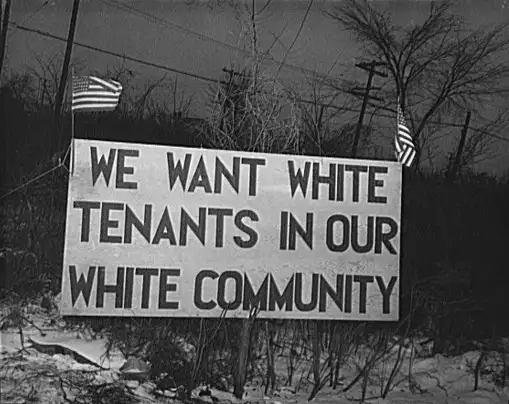
Detroit, 1942
Fast As Lightning
Yes, there was a time in America when being a Black athlete was taboo. But Jesse Owens, who should be regarded as one of the greatest champions of sport and a pioneer of the lead-by-example era, was born at the height of that time. On September 12, 1913, a sharecropper named Henry Cleveland Owens and Mary Emma Fitzgerald gave birth to James Cleveland Owens, their tenth child. Jesse was born in Oakville, Alabama but eventually moved to Cleveland, Ohio due to the economic conditions of the time.
You see, the harsh realities of slavery that had recently been abolished still took a toll on the families of former slaves. A "Great Migration" of sorts resulted in over a million African Americans moving en masse from the South to the North in search of better opportunities for their families. Jesse's family successfully migrated, but life wasn't easy. In fact, the reason we know him as "Jesse" today is that one of his teachers couldn't understand his strong southern accent and heard "Jesse" instead of J.C. (James Cleveland).
Despite the struggles of his family, Jesse found time to fall in love with running. He worked various hard jobs, such as delivering groceries, working at a shoe repair shop, and loading freight cars to make ends meet, but still found time to pursue his passion for running. His determination and hard work paid off, as he went on to become one of the
greatest athletes of all time.
“RACE” 2016 Jesse Owens Biopic
Even while still in junior high school, Jesse Owens had to work after school. But his track coach, Charles Riley, allowed Jesse to practice early in the morning before class. This early training instilled in Jesse the perseverance that would serve him well on the world stage. By the time he reached high school, Jesse had equaled the World Record for the 100-yard race (equivalent to 91m), crossing the finish line at 9.4 seconds!
"I let my feet spend as little time on the ground as possible. From the air, fast down, and from the ground, fast up." - Jesse Owens
Jesse's talents eventually led him to Ohio State University, where he would win 8 individual NCAA championships. His record for the 100-meter dash stood for 80 years and was only recently broken in 2019 by OSU phenom Nick Gray. But, it's important to remember that this was a different time. Despite his success on the track field, Jesse had to live off-campus with other African American athletes due to segregation. For track meets, this also meant eating in or finding available "blacks-only" restaurants in a particular city, and staying at black-only hotels.
Jesse Owens's astounding abilities didn't even earn him the "free ride" to college that is now common for prominent athletes in the behemoth that is American collegiate athletics. He did not have a scholarship. Instead, Jesse Owens had to work while in school to cover his costs, all while training to shatter world records.
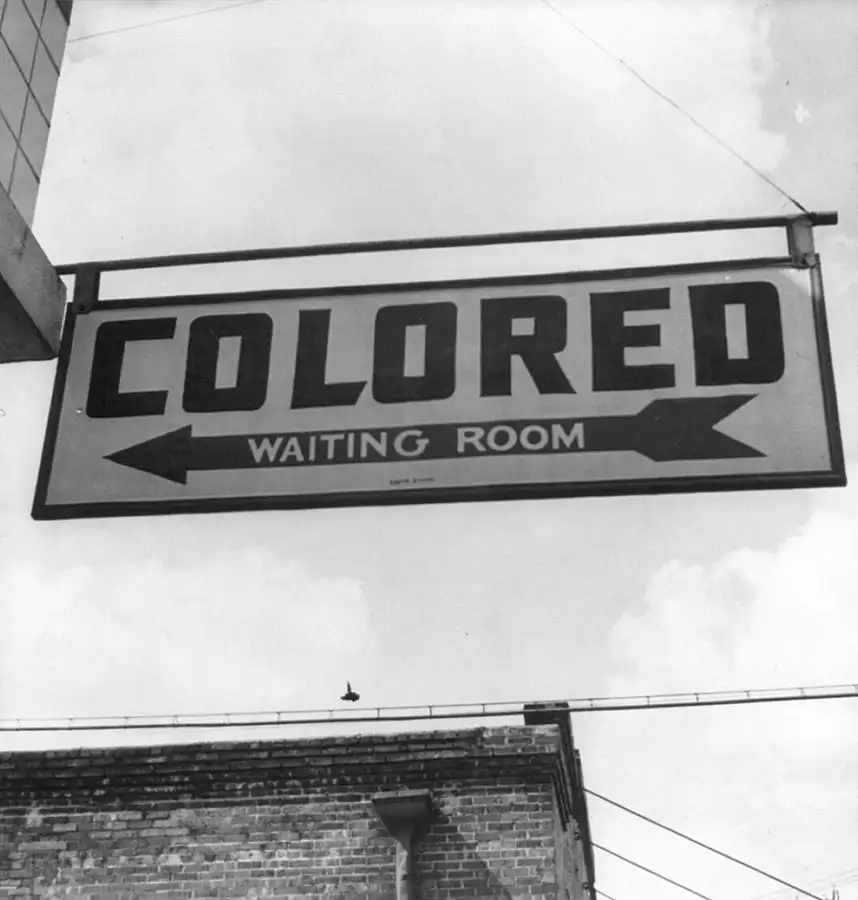 Georgia, 1943
Georgia, 1943
And shatter world records he did. During a 1935 track meeting in Ann Arbor, Michigan, Jesse Owens made a name for himself. In less than an hour, the 22-year-old unleashed his talents, exploding out of the blocks and setting three world records and equaling a fourth. He was tied for the world's fastest man, running 100 yards in 9.4 seconds. He set world records for the 220-yard low hurdles event, the 220-yard sprint, and the long jump. It was not only one of the greatest athletic feats for an African American at the time, but it was also one of the greatest on Earth in that era!
If that wasn't enough, Jesse Owens put on a repeat performance a year later at the 1936 Olympics. The games were hosted in Berlin that year, and Nazi Germany was dealing with its own sickening racist ideology. It's understood that the leadership of the nation at the time felt their "master" race to be superior to others and was anticipating the games would serve as a means of demonstrating to the world their perceived superiority.
But truth has a way of ridiculing perception. Representing the United States (and by implication the African American race), Jesse Owens lived up to the moment and channeled the perseverance he had developed through decades of training, in spite of the abusive racist practices of his day. Jesse Owens collected a whopping four gold medals throughout the Games of the XI Olympiad! His performance at the 1936 Olympics serves as a powerful rebuke to racist ideologies and a reminder of the strength and determination of marginalized communities.
He won a gold medal for the long jump, 4x100 Meter relay, 200-meter and 100-meter dash, cementing him as the fastest and highest jumping man of his time and throwing a wrench into the dangerous and repulsive racist ideology of the (any) master race. Unfortunately, this thinking was so deeply ingrained that it didn't immediately change things back at home.
"[The German Chancellor] didn't snub me—it was our [U.S.] president who snubbed me. The president didn't even send me a telegram." - Jesse Owens
Lightning Rods
Some took Owens's performance as proof that African Americans are indeed of a "slave-class" race imbued with "enhanced" physical attributes best suited for hard labor. There were even those who suggested there was an inherent unfair advantage in allowing them to compete against their white counterparts at the games.
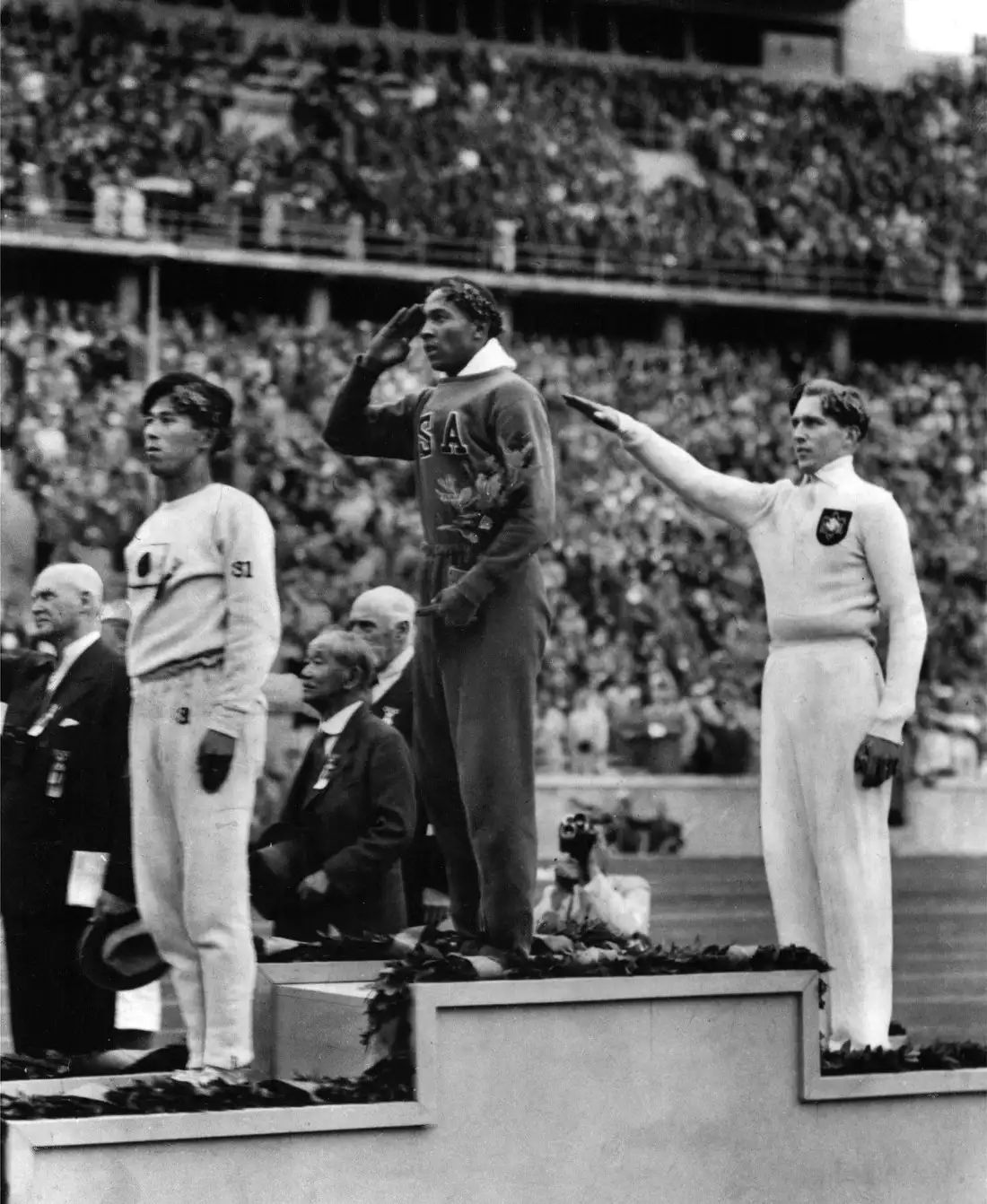
Owens Victorious
After returning victorious, Jesse Owens and his newly acquired hardware took part in a ticker-tape parade in New York City. However, at the end of the parade, Owens was still not allowed to enter the "whites" front entrance of the famed Waldorf Astoria and had to take a back entrance. Because of financial disputes likely fueled by racism in athletic commissions at the time, Owens's would soon lose his amateur status and ability to compete.
"There was no television, no big advertising, no endorsements then. Not for a Black man, anyway." - Jesse Owens
Although his track career was cut short, Owens maintained his knack for hard work throughout his career. He held various posts including serving as a director in the Ford motor company, a co-founder of the short-lived West Coast Negro Baseball League, running instructor for the New York Mets, owner of a dry cleaning business, and a US Goodwill Ambassador. Jesse Owens's legacy serves as a reminder of the resilience and determination of marginalized communities, and the importance of fighting for representation and opportunity.
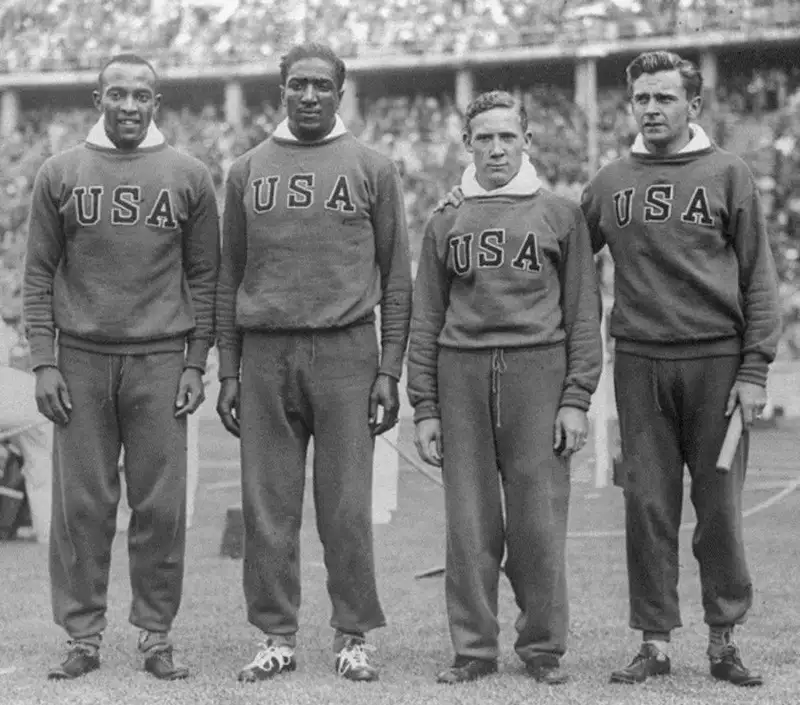
Team USA 1936
The next Usain Bolt may expect a full ride scholarship, luxurious perks, and multimillion dollar endorsement deals, but it's important for them to remember the struggles and sacrifices of those who came before them. Athletes like Jesse Owens, who had to fight and endure harder trials, and receive fewer perks and recognition for their efforts.
No matter what your passion is, keep pushing through the tough times. You never know where your perseverance and hard work will take you. Today's fastest man, Jamaica's Usain Bolt, earned $34.2 million in winnings and endorsements in 2017! And who knows, your efforts today may inspire the next generation of athletes to reach new heights. It's worth noting, in addition to being among the first African American athletes to reach such historic Olympic success, Jesse Owens also owns the distinction of being the first African American male athlete to have an endorsement deal, as he was convinced by Adolf Dassler, founder of Adidas, to wear their sneakers for the 1936 Olympics.
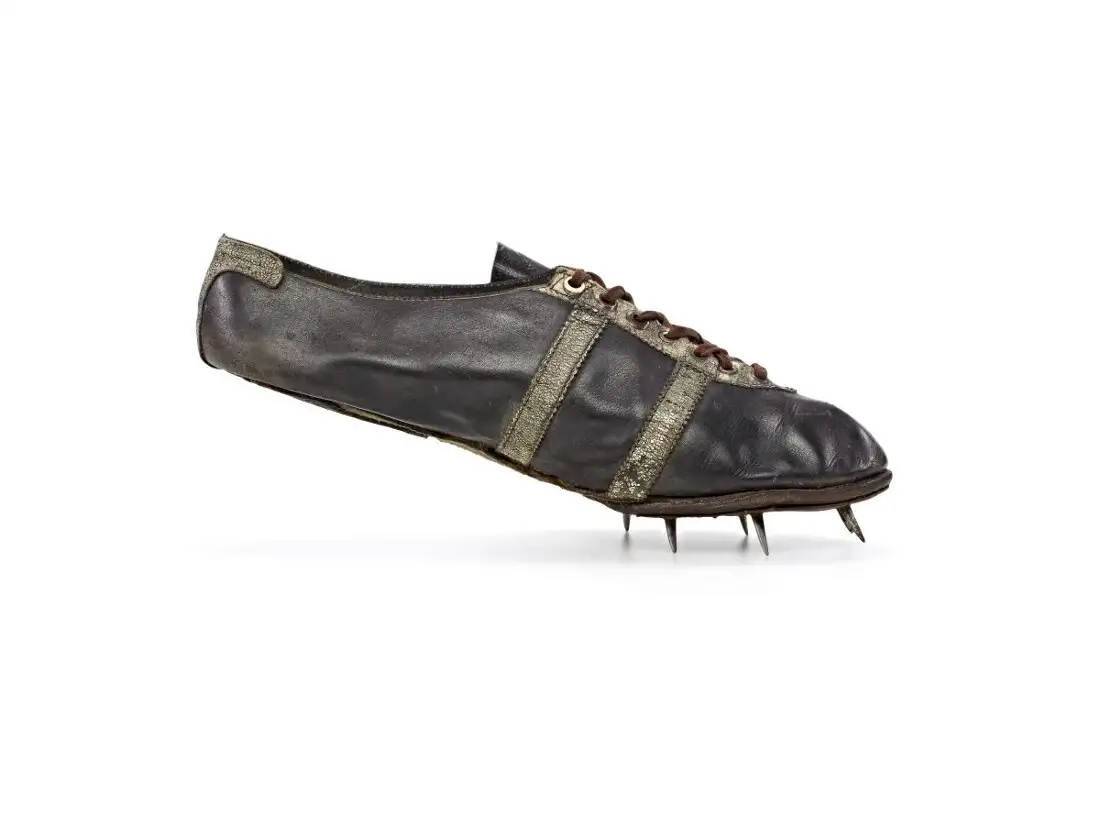
Image: Adidas

